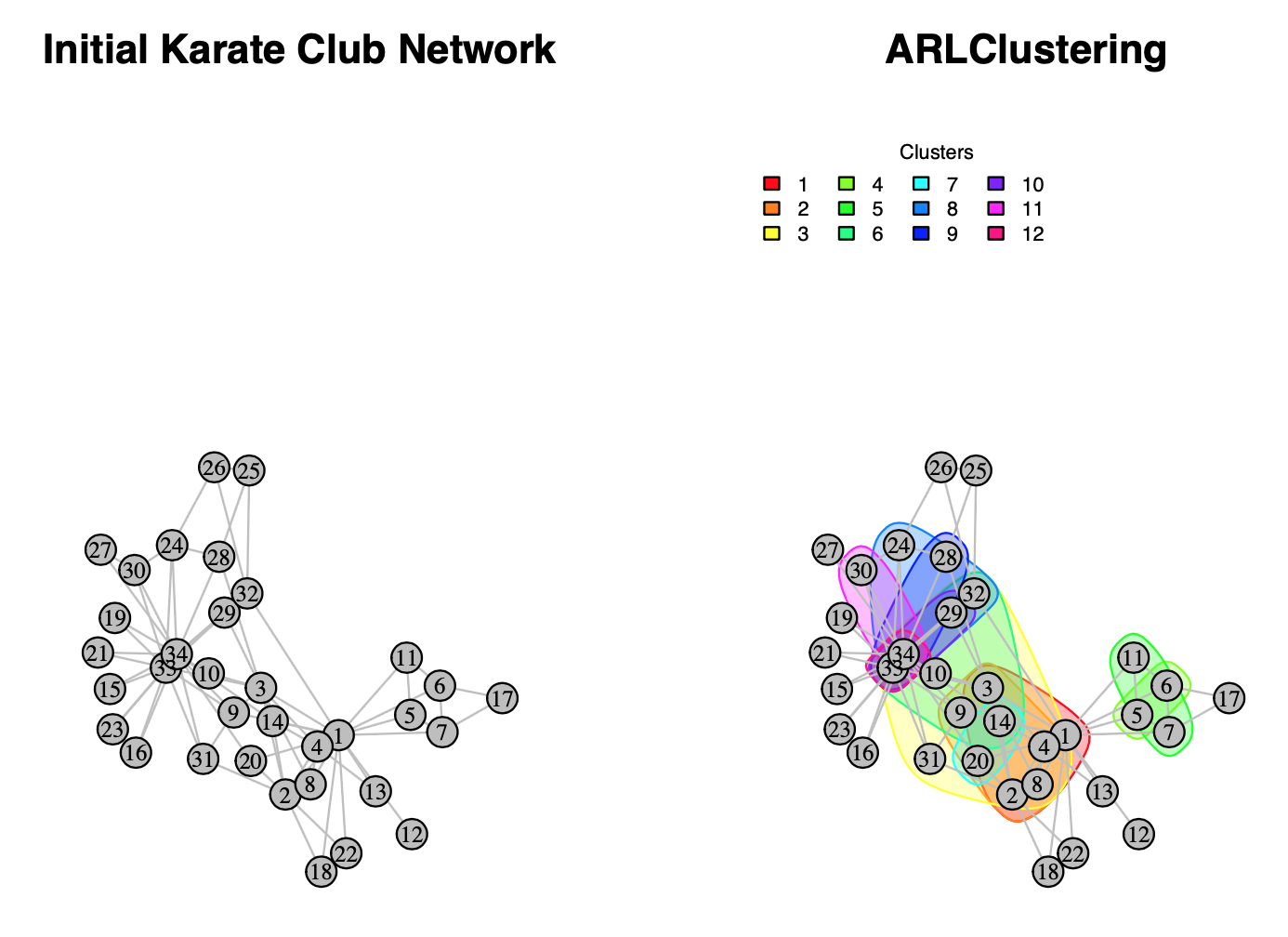
ARLClustering is an R package designed for network data
analysis, leveraging association rules to examine node interactions
within networks. This package introduces a novel approach to community
detection using data-mining techniques to highlight communities within
the social network.
Community detection is a critical aspect of network analysis,
providing insights into the modular structure of networks.
ARLClustering package enhances this
process by applying data-mining techniques to uncover hidden patterns
and relationships among nodes. It provides functions to preprocess
network data, generate association rules, and identify clusters within
the network based on these rules.
This package is particularly useful for researchers and practitioners in fields such as social network analysis, biology, and communication networks, who require useful tools for applying their community detection analysis.
You can install the ARLClustering package directly from
GitHub using the devtools package:
devtools::install_github("assuom44/arlclustering")An overview of the main functions provided by the
ARLClustering package:
get_network_dataset():Loads a network dataset and
converts it into a graph object.
arlc_gen_transactions():Generates a transactional
dataset from a graph for association rule mining.
arlc_get_apriori_thresholds():Finds the best
thresholds for the Apriori algorithm based on the provided
dataset.
arlc_gen_gross_rules():Executes the
Apriori algorithm to generate gross association
rules.
arlc_get_NonR_rules():Eliminate non redundant rules
from the gross rules generated from previous step.
arlc_get_significant_rules():Choose significant
rules from the non redundant rules generated from previous
step.
arlc_clean_final_rules():Cleans the pre-processed
rules to remove redundancy and insignificance.
arlc_generate_clusters():Generates potential
clusters based on the pre-processed rules.
arlc_clusters_plot():Displays the obtained result as
a plot if the total number of nodes less than 70. Otherwise, it displays
the list of the identified communities.
Here is examples of the arlc_get_network_dataset call
for each of the provided synthetic network datasets, the network is
loaded then on variable g:
dataset_path <- system.file("extdata", "karate.gml", package = "arlclustering")
g <- arlc_get_network_dataset(dataset_path, "Karate Club")
dataset_path <- system.file("extdata", "dolphins.gml", package = "arlclustering")
g <- arlc_get_network_dataset(dataset_path, "Dolphins Network")
dataset_path <- system.file("extdata", "lesmiserables.gml", package = "arlclustering")
g <- arlc_get_network_dataset(dataset_path, "LesMiserables Network")
dataset_path <- system.file("extdata", "word_adjacencies.gml", package = "arlclustering")
g <- arlc_get_network_dataset(dataset_path, "Word Adjacencies Network")
dataset_path <- system.file("extdata", "netscience.gml", package = "arlclustering")
g <- arlc_get_network_dataset(dataset_path, "NetScience Network")
dataset_path <- system.file("extdata", "Facebook_fiends.gml", package = "arlclustering")
g <- arlc_get_network_dataset(dataset_path, "Facebook-friends Network")
dataset_path <- system.file("extdata", "Facebook_Org_L1.gml", package = "arlclustering")
g <- arlc_get_network_dataset(dataset_path, "Facebook-L1-org Network")Generating the transactions into the variable trx:
trx <- arlc_gen_transactions(g$graph)Getting the apriori parameters, the computed parameters
will be used for generating the best rule set. Here is an example of
each of the provided dataset examples:
-- Kerate
params <- arlc_get_apriori_thresholds(trx, supportRange = seq(0.1, 0.2, by = 0.1), 0.5)
-- Dolphins
params <- arlc_get_apriori_thresholds(trx, supportRange = seq(0.05, 0.06, by = 0.01), 0.5)
-- LesMiserables
params <- arlc_get_apriori_thresholds(trx, supportRange = seq(0.04, 0.05, by = 0.01), 0.5)
-- WordAdjacency
params <- arlc_get_apriori_thresholds(trx, supportRange = seq(0.03, 0.04, by = 0.01), 0.5)
-- NetScience
params <- arlc_get_apriori_thresholds(trx, supportRange = seq(0.011, 0.012, by = 0.001), 0.5)
-- Facebook-Freinds
params <- arlc_get_apriori_thresholds(trx, supportRange = seq(0.04, 0.05, by = 0.01), 0.5)
-- Facebook-L1-Organization
params <- arlc_get_apriori_thresholds(trx, supportRange = seq(0.05, 0.06, by = 0.01), 0.5)Generating the gross rules using the computed apriori
parameters. The result is stored in the the variable
grossRules:
grossRules <- arlc_gen_gross_rules(trx, minSupp = params$minSupp, minConf = params$minConf, minLenRules = 1, maxLenRules = params$lenRules)Filtering the generated gross rules through non redundant and
significant rules. The final result is stored in the variable
NonRSigRules:
NonRedRules <- arlc_get_NonR_rules (grossRules$GrossRules)NonRSigRules <- arlc_get_significant_rules (trx, NonRedRules$FiltredRules)Cleaning the obtained result:
cleanedRules <- arlc_clean_final_rules (NonRSigRules$FiltredRules)Generating clusters:
c <- arlc_generate_clusters (cleanedRules) Displaying results:
arlc_clusters_plot(g$graph, g$graphLabel, c$Clusters)In case the total number of nodes is less than 100 nodes, a plot of
the ARLClustering communities will be generated, otherwise
only a display of the list of Sets (communities) will be proposed.
ARLClustering’s outputs for Karate Club social
network:
Total Identified Clusters: 5
=========================
Community 01 : 1 2 3 4 8 14
Community 02 : 2 3 4 8 9 14
Community 03 : 3 4 8 14 31 32 34
Community 04 : 5 6
Community 05 : 7 11
Community 06 : 9 14 32 33
Community 07 : 14 20
Community 08 : 24 32 34
Community 09 : 28 33
Community 10 : 29 33
Community 11 : 30 34
Community 12 : 33 34
=========================
Contributions to the ARLClustering package are welcome!
If you encounter any issues or have suggestions for improvements, please
feel free to open an issue or submit a pull request on GitHub.
ARLClustering is released under the GPL-3 license.